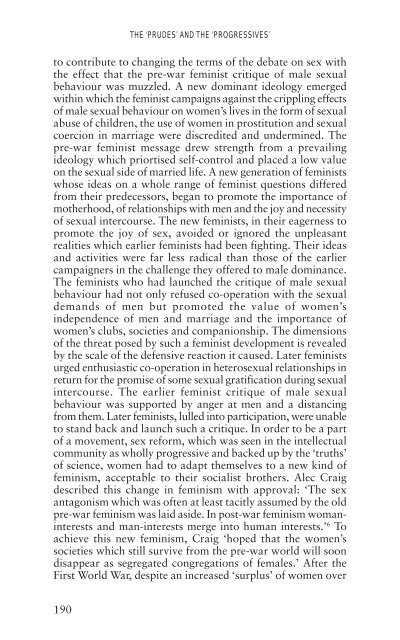The Spinster and Her Enemies - Feminish
The Spinster and Her Enemies - Feminish
The Spinster and Her Enemies - Feminish
Create successful ePaper yourself
Turn your PDF publications into a flip-book with our unique Google optimized e-Paper software.
THE ‘PRUDES’ AND THE ‘PROGRESSIVES’<br />
to contribute to changing the terms of the debate on sex with<br />
the effect that the pre-war feminist critique of male sexual<br />
behaviour was muzzled. A new dominant ideology emerged<br />
within which the feminist campaigns against the crippling effects<br />
of male sexual behaviour on women’s lives in the form of sexual<br />
abuse of children, the use of women in prostitution <strong>and</strong> sexual<br />
coercion in marriage were discredited <strong>and</strong> undermined. <strong>The</strong><br />
pre-war feminist message drew strength from a prevailing<br />
ideology which priortised self-control <strong>and</strong> placed a low value<br />
on the sexual side of married life. A new generation of feminists<br />
whose ideas on a whole range of feminist questions differed<br />
from their predecessors, began to promote the importance of<br />
motherhood, of relationships with men <strong>and</strong> the joy <strong>and</strong> necessity<br />
of sexual intercourse. <strong>The</strong> new feminists, in their eagerness to<br />
promote the joy of sex, avoided or ignored the unpleasant<br />
realities which earlier feminists had been fighting. <strong>The</strong>ir ideas<br />
<strong>and</strong> activities were far less radical than those of the earlier<br />
campaigners in the challenge they offered to male dominance.<br />
<strong>The</strong> feminists who had launched the critique of male sexual<br />
behaviour had not only refused co-operation with the sexual<br />
dem<strong>and</strong>s of men but promoted the value of women’s<br />
independence of men <strong>and</strong> marriage <strong>and</strong> the importance of<br />
women’s clubs, societies <strong>and</strong> companionship. <strong>The</strong> dimensions<br />
of the threat posed by such a feminist development is revealed<br />
by the scale of the defensive reaction it caused. Later feminists<br />
urged enthusiastic co-operation in heterosexual relationships in<br />
return for the promise of some sexual gratification during sexual<br />
intercourse. <strong>The</strong> earlier feminist critique of male sexual<br />
behaviour was supported by anger at men <strong>and</strong> a distancing<br />
from them. Later feminists, lulled into participation, were unable<br />
to st<strong>and</strong> back <strong>and</strong> launch such a critique. In order to be a part<br />
of a movement, sex reform, which was seen in the intellectual<br />
community as wholly progressive <strong>and</strong> backed up by the ‘truths’<br />
of science, women had to adapt themselves to a new kind of<br />
feminism, acceptable to their socialist brothers. Alec Craig<br />
described this change in feminism with approval: ‘<strong>The</strong> sex<br />
antagonism which was often at least tacitly assumed by the old<br />
pre-war feminism was laid aside. In post-war feminism womaninterests<br />
<strong>and</strong> man-interests merge into human interests.’ 6 To<br />
achieve this new feminism, Craig ‘hoped that the women’s<br />
societies which still survive from the pre-war world will soon<br />
disappear as segregated congregations of females.’ After the<br />
First World War, despite an increased ‘surplus’ of women over<br />
190

















